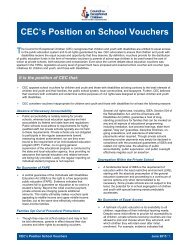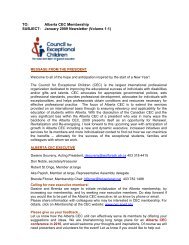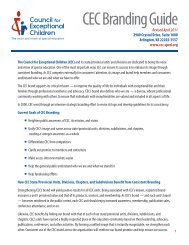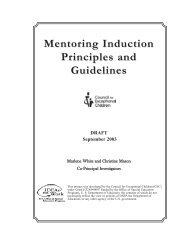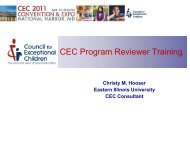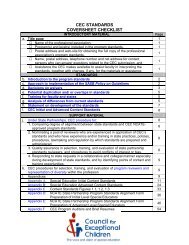What Every Must Know Special Educator - Council for Exceptional ...
What Every Must Know Special Educator - Council for Exceptional ...
What Every Must Know Special Educator - Council for Exceptional ...
Create successful ePaper yourself
Turn your PDF publications into a flip-book with our unique Google optimized e-Paper software.
placements or services constitute a change in the<br />
child’s Individualized Education Program and<br />
should thus follow the procedures and protections<br />
required.<br />
d. Recognize that children vary in the degree and<br />
manner in which they come into contact with<br />
other children and school staff.<br />
e. Provide education staff with the necessary<br />
in<strong>for</strong>mation, training, and hygienic resources to<br />
provide <strong>for</strong> a safe environment <strong>for</strong> students and<br />
educational staff.<br />
f. Provide students with appropriate education<br />
about infectious diseases and hygienic measures<br />
to prevent the spread of such diseases.<br />
g. Provide, where appropriate, infected children with<br />
education about the additional control measures<br />
that they can practice to prevent the transmission<br />
of the disease agent.<br />
h. Enable educational personnel who are medically<br />
at high risk to work in environments which<br />
minimize such risk.<br />
i. Provide educational personnel with adequate<br />
protections <strong>for</strong> such personnel and their families<br />
if they are exposed to such diseases through their<br />
employment.<br />
The <strong>Council</strong> believes that special education personnel<br />
preparation programs should:<br />
a. Educate students about infectious diseases and<br />
appropriate methods <strong>for</strong> their management.<br />
b. Counsel students as to how to determine their<br />
level of medical risk in relation to certain diseases<br />
and the implications of such risk to career choice.<br />
The <strong>Council</strong> believes that the manner in which policies<br />
<strong>for</strong> managing infectious diseases are developed and<br />
disseminated is important to their effective implementation.<br />
There<strong>for</strong>e the following must be considered<br />
integral to any such process:<br />
a. That they be developed through the collaborative<br />
ef<strong>for</strong>ts of health and education agencies at both the<br />
state, provincial and local levels, reflecting state,<br />
provincial and local educational, health and legal<br />
requirements.<br />
262 whAt every SpeCiAl eduCAtor muSt <strong>Know</strong><br />
b. That provision is made <strong>for</strong> frequent review and<br />
revision to reflect the ever-increasing knowledge<br />
being produced through research, case reports,<br />
and experience.<br />
c. That policies developed be based on reliable<br />
identified sources of in<strong>for</strong>mation and scientific<br />
principles endorsed by the medical and educational<br />
professions.<br />
d. That such policies be understandable to students,<br />
professionals, and the public.<br />
e. That policy development and dissemination be a<br />
continual process and disassociated from pressures<br />
associated with precipitating events.<br />
Paragraph 21 - Career Education<br />
Career education is the totality of experience through<br />
which one learns to live a meaningful, satisfying work<br />
life. Within the career education framework, work is<br />
conceptualized as conscious ef<strong>for</strong>t aimed at producing<br />
benefits <strong>for</strong> oneself and/or others. Career education<br />
provides the opportunity <strong>for</strong> children to learn, in the<br />
least restrictive environment possible, the academic,<br />
daily living, personal-social and occupational knowledge,<br />
and specific vocational skills necessary <strong>for</strong> attaining<br />
their highest levels of economic, personal, and<br />
social fulfillment.<br />
The individual can obtain this fulfillment though work<br />
(both paid and unpaid) and in a variety of other social<br />
roles and personal lifestyles, including his or her pursuits<br />
as a student, citizen, volunteer, family member,<br />
and participant in meaningful leisure time activities.<br />
Children with exceptionalities (i.e., those whose<br />
characteristics range from profoundly and severely<br />
disabled to those who are richly endowed with talents<br />
and/or intellectual giftedness) include individuals<br />
whose career potentials range from sheltered to competitive<br />
work and living arrangements. Children with<br />
exceptionalities require career education experiences<br />
which will develop to the fullest extent possible their<br />
wide range of abilities, needs, and interests.<br />
It is the position of The <strong>Council</strong> that individualized<br />
appropriate education <strong>for</strong> children with exceptionalities<br />
must include the opportunity <strong>for</strong> every student<br />
to attain his or her highest level of career potential<br />
through career education experiences. Provision <strong>for</strong><br />
these educational experiences must be reflected in an<br />
individualized education program <strong>for</strong> each exceptional<br />
child, which must include the following:




